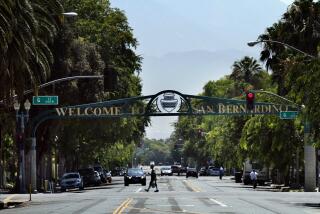When it came to taxes, islanders dared to say no : Other Maine island communities plan similar revolts after citizens secede from Portland.
- Share via
LONG ISLAND, Me. — When a late storm last winter dumped more than a foot of snow on this small coastal island, it didn’t much faze newly elected Selectman Donald Mac Vane.
“It’s still the city’s snow,” the 65-year-old lobsterman joked, meaning that, for the moment, the island belonged to the city of Portland, and Portland was responsible for plowing its streets.
But Mac Vane and others will have to worry about cleaning up the snow next winter, when the city of Portland won’t be providing that--or any other--service here.
Starting July 1, responsibility for everything from hauling trash to dousing fires and educating schoolchildren on this 900-acre island in Casco Bay will fall to its 160 year-round and 900 summer residents. That’s when the island will formally cut its historic ties to mainland Portland and incorporate as a separate town.
The event, which the residents of Long Island plan to celebrate in festive style, will mark the final chapter of a dramatic secession movement in this normally sleepy fishing village and summer colony 4.5 miles from the Maine coast.
Outrage over increased taxes and alleged neglect by Portland’s city government sparked Long Island’s rebellion, which has focused new attention on the special needs of the state’s other islands--15 year-round and 24 seasonally inhabited isles among the 3,500 dotting Maine’s scenic coastline.
“Long Island added to the awareness of islands--principally in Casco Bay, but rippling through the state,” said Annette Naegel, director of science and stewardship at Maine’s Island Institute. Portland has seven other inhabited islands in the bay, and four are considering breaking away.
The revolt on Long Island erupted in the spring of 1991 after Portland’s first property revaluation in years caused steep increases in the values of island homes. The increases, which far outpaced those in the city’s mainland neighborhoods, doubled and tripled tax bills for island residents.
After a “bunch of angry meetings on the island and in Portland,” islanders “started joking: ‘Let’s secede from Portland, we don’t need them anyway,’ ” recalled Nancy Jordan, now a member of the Long Island School Committee.
The joke soon turned serious, as islanders formed a committee to explore secession. Not long after, they filed state legislation to seek a local referendum on the issue. Several other Portland islands did the same, but it was Long Island’s bill that made headway in Augusta, guided by residents who trekked to the capital to lobby for it.
Even islanders skeptical of secession at first came to embrace it eventually. For many, the tax raises simply ignited a spirit of independence that had been building.
Mac Vane said islanders have long grumbled that they were paying more than their share of taxes, and getting minimal services in return. “We were very low on the totem pole,” he said.
Like America’s colonialists, many islanders blamed the problem on taxation without representation. “We never have any say. They tell us out of Portland what we’re going to do and what we can’t do,” said lobsterman George (Bud) Johnson.
Support for secession was not universal. Islanders engaged in lively campaigns for and against a referendum on the issue last November. Opponents worried about the loss of services from Portland, particularly emergency response. In the end, supporters prevailed, 129 to 44.
“There was a real feeling of excitement in the air. It finally happened,” recalled Jordan.
Since then, islanders have been busy preparing for July 1. A board of selectmen and a school committee have been chosen, and scores of residents have volunteered for committees to plan everything from public safety to trash collection.
One pressing problem is how to pay town expenses from July until September, when the first tax bills go out. Island officials have been selling T-shirts and accepting donations to raise some initial cash; they hope to keep the town afloat after July 1 by borrowing money and asking residents to pay their taxes early.
Other decisions include where to locate town hall, whether to hire an administrator and what to do about trash collection--the city has always carted the trash away on a barge. Negotiations must also be concluded to provide for emergency service to the island by Portland’s Fire Department boat.
“None of us are politicians,” said Mac Vane.
While Long Islanders plan their new town, four other Portland islands have filed bills seeking the right to vote on secession--three are considering becoming villages of Long Island. The city is actively opposing those moves.
City Manager Robert Ganley insisted that Portland never opposed Long Island’s breakaway but acknowledged that criticism by islanders, “left a bad taste” in the mouths of many city officials.
Islanders say they hope to patch up relations with the city, even as they prepare for living without it. Jordan said she is confident that, in time, the island will learn to be a town. But “every day,” she conceded, “I’m amazed at how much we have to do.”
More to Read
Sign up for Essential California
The most important California stories and recommendations in your inbox every morning.
You may occasionally receive promotional content from the Los Angeles Times.










